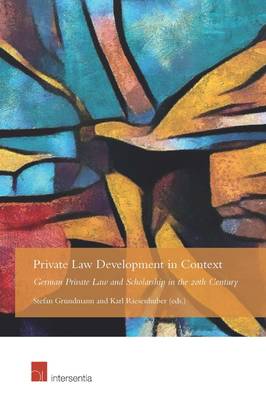
- Retrait gratuit dans votre magasin Club
- 7.000.000 titres dans notre catalogue
- Payer en toute sécurité
- Toujours un magasin près de chez vous
- Retrait gratuit dans votre magasin Club
- 7.000.0000 titres dans notre catalogue
- Payer en toute sécurité
- Toujours un magasin près de chez vous
Private Law Development in Context
German Private Law and Scholarship in the 20th Century
Stefan Grundmann, Karl Riesenhuber
Livre relié | Anglais
192,95 €
+ 385 points
Description
While common law is developed by the courts and judges and may well be the prime authorities for the development of law, and while French private law is said to be the origin of the idea of modern codification and grand legislatures, German private law can well be seen as the law where the influence of academia is paramount.It is perhaps fair to say that no other code is as strongly influenced by scholars as the German Civil Code of 1900. Furthermore, in both the past and the present, courts and scholars in Germany are in constant dialogue about the application and interpretation of German and also EU law. Arguably, this is also one of the reasons why German academia plays such a prominent some may say excessively dominant role in the European private law discourse and development.As a result it seems necessary, indeed vital, to shed more light on professors who were highly influential in the development of German private law in the 20th century. They fostered such concepts and ideas as the birth of modern market and institutional regulation, genuine internationalisation, in particular through comparative law, and Europeanisation of private law, social areas of the law, particularly labour and consumer law and fundamental rights protection between private parties, and equally the law of competition and enterprise.This book compiles and puts into perspective portraits of 37 professors of private law from Germany, Austria and Switzerland who completed the core of their academic oeuvre in the 20th century. The individual portraits of the life and work of each professor are written by one of their former 'Schler' and taken together show the thread of the intellectual history of legal thinking in 20th century German private law.
Spécifications
Parties prenantes
- Auteur(s) :
- Editeur:
Contenu
- Nombre de pages :
- 886
- Langue:
- Anglais
Caractéristiques
- EAN:
- 9781780683928
- Date de parution :
- 21-02-18
- Format:
- Livre relié
- Format numérique:
- Genaaid
- Dimensions :
- 160 mm x 240 mm
- Poids :
- 1569 g

Les avis
Nous publions uniquement les avis qui respectent les conditions requises. Consultez nos conditions pour les avis.






